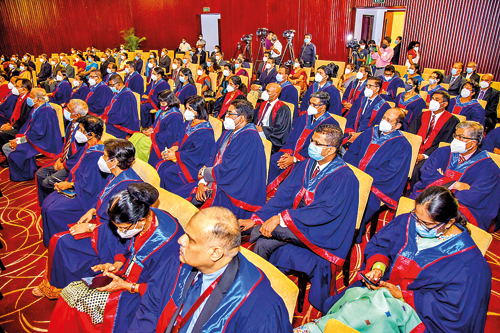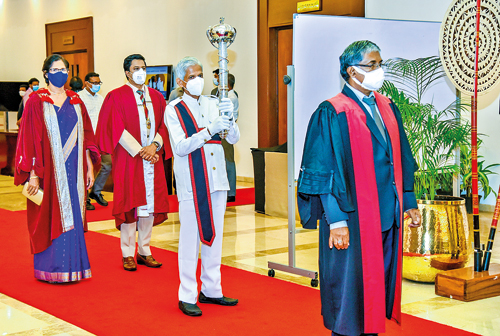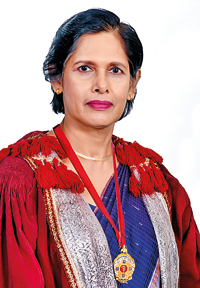News
Strengthening medical rehab for all the people her vision
Emphasis on stroke and geriatric services as well as psychoactive substance rehabilitation

The august gathering at the induction ceremony
The august gathering was all eyes and ears as she turned the spotlight fully not on the usual and popular medical issues but on topics which get little attention.
With strong facts and figures, the 127th President of the Sri Lanka Medical Association (SLMA), Dr. Padma Gunaratne brought into an important ceremony an image of the struggles and travails of the humble men, women and children when faced with the need for rehabilitation for medical disabilities including stroke and geriatric services as well as Psychoactive substance rehabilitation.
The strengthening and improvement of these services will be the quest of Dr. Gunaratne as she leads this 130-year-old apex professional organisation of all medical practitioners in 2021 with the support of her “multifaceted, enthusiastic and committed” council……and this is the pledge she made at her induction on January 23 at the BMICH, Colombo.
“I have first-hand experience on these needs as I seem to have been at the right place at the right time,” Dr. Gunaratne tells the Sunday Times this week, reiterating that these are also things very close to her heart.
While she is a Senior Consultant Neurologist treating stroke victims and also launched the Stroke Support Organisation for Sri Lankans, she is the Chair of the Interim Specialty Board in Rehabilitation Medicine of the Post Graduate Institute of Medicine (PGIM).
Referring to a “drop” out of the ocean of medical rehabilitation, Dr. Gunaratne pointed out that in these challenging times of COVID-19, the pandemic impacts on the physical, mental, social and spiritual well-being which is an integral part of an individual’s health.
“While the physical and mental impact of COVID-19 may remain for longer than one would envisage, the psychological consequences could be due to the loss of a loved one or economic losses. Research shows that COVID-19 has caused a rise in family disputes and it is likely that other non-communicable diseases (NCDs) may also show an increase owing to the unhealthy lifestyle brought on with the restrictions imposed on the movement of people. In addition, COVID-19 has also shown us how it could affect spiritual well-being. Certain communities were disturbed by the policy of essential cremation for all COVID-19 positive deaths,” she said.

Dr. Padma Gunaratne arrives in procession for the event
Emphasising that the physical, mental, social and spiritual well-being of people would be essential for the healthy economic growth of the country, she also underscored that it is imperative for a wide range of rehabilitation measures to be offered to all those affected in various ways following the outbreak. The government has implemented certain steps to reduce the economic impact of COVID-19. In terms of health, while realising that there is vast room for improvement from healthcare to humanitarian care, the contribution by healthcare professionals, along with the tri-forces and the police, is praiseworthy.
It is in this perspective, said Dr. Gunaratne that she is talking about medical rehabilitation, a specialty relevant to a range of disabilities originating from any form of physical or mental disorder. The hallmark of successful rehabilitation is multi-disciplinary team care. While appreciating the significant contributions made by the tri-forces and the Specialists in Rheumatology and Rehabilitation in the past several decades, medical rehabilitation as a specialty is still evolving.
She said: “It has been found that many medical schools lack comprehensive and adequate education on rehabilitation even though patients under a range of specialties including neurology, rheumatology, orthopaedics, neurosurgery, geriatrics, ophthalmology, ENT (ear, nose and throat) and paediatrics require these services. Within these specialties, stroke, spinal cord injury, cerebral palsy, cerebral infections, musculo-skeletal disorders, visual handicaps and impaired hearing are common.”
Citing the SLMA’s contribution to the development of medical rehabilitation as preparing a ‘Report on Disabilities’ in 2008 on which was based the Health Ministry’s National Guidelines for Rehabilitation Services from 2014-2018, Dr. Gunaratne explained that the PGIM initiated the MD in Rehabilitation Medicine programme (there are eight trainees so far with the first MD qualified specialist expected to be Board Certified in 2023) in 2018. This is while, on a proposal submitted by her last year (2020), the SLMA initiated the Expert Committee for Rehabilitation of Disabilities to take medical rehabilitation to great heights, by carrying out SLMA-based skills development programmes for multi-disciplinary team members this year.
Looking next at the rehabilitation of stroke victims, she says that cardiovascular diseases including stroke are currently the leading cause of death in Sri Lanka, while stroke was the 3rd leading cause of hospital deaths in 2013 and 7th in 2017.

Dr. Padma Gunaratne
Dr. Gunaratne said: “Stroke is the leading cause of adult disability and an ageing population further increases the prevalence of stroke, as well as disability in the community. There are around 1,100 stroke admissions per year to the National Hospital of Sri Lanka and about 1,500 at the Kandy National Hospital.
“In a setting where we discuss the ethics of equity, the burning question is whether these patients get their fair share of our free health service, when compared to other patient groups. In keeping with the developments of the rest of the world, the very first Stroke Unit was established in Sri Lanka in 1998. Since then, due to the constant lobbying by the National Stroke Association of Sri Lanka, along with the Association of Sri Lankan Neurologists, to the Health Ministry, has seen significant improvements in stroke services.
“Our achievements over the last two decades with regard to stroke treatment and care are substantial, but there is a compelling need to expedite the establishment of more Stroke Units, taking into considering the rising elderly population, the increasing number of strokes and providing equity in services. Therefore, the SLMA council will be paying special attention to improving stroke care in Sri Lanka in 2021.”
Referring to geriatric services, Dr. Gunaratne said that Sri Lanka is currently having a “window of opportunity” or “demographic dividend” to achieve rapid economic growth with a larger working-age population compared to the population in the non-working age. It is prudent that the healthcare system is able to anticipate an increase in the elderly population and address the challenges that would become a problem to the community, well in advance.
“A majority of the problems faced by the elderly are unique to them and include mental health issues such as depression and dementia, as well as falls, musculo-skeletal problems, nutrition issues, incontinence, hearing problems and visual handicaps. Unless there are well trained multi-disciplinary teams of healthcare professionals to take care of these issues, we could become the victims of the consequences of poorly-trained and under-prepared systems,” she said.
Pointing out that medical undergraduates are either not exposed or are exposed only to one or two didactic lectures in geriatrics, she said that in 2013, the PGIM commenced a Diploma in Elderly Medicine and it has produced 105 trained diploma holders. The MD in Geriatrics programme which commenced in 2018 has 12 trainees with the first Board Certification of a Specialist in Geriatric Medicine due in 2024. The MD in Old Age Psychiatry which commenced in 2017 has four trainees. As such, there is considerable room for SLMA advocacy and the SLMA intends to work closely with the National Council for Elders and the Sri Lankan Association of Geriatric Medicine.
Another area in which Dr. Gunaratne and the SLMA are hoping to be active in, is the rehabilitation of psychoactive substance (cannabis, heroin, methamphetamines and hashish) users, in collaboration with the National Dangerous Drug Control Board and the National Authority on Tobacco & Alcohol.
In a move away from tradition, after her induction speech in English, Dr. Gunaratne also gave a short summary in Sinhala. The whole ceremony, with two short interludes for some poignant songs, worked with clockwork precision.


